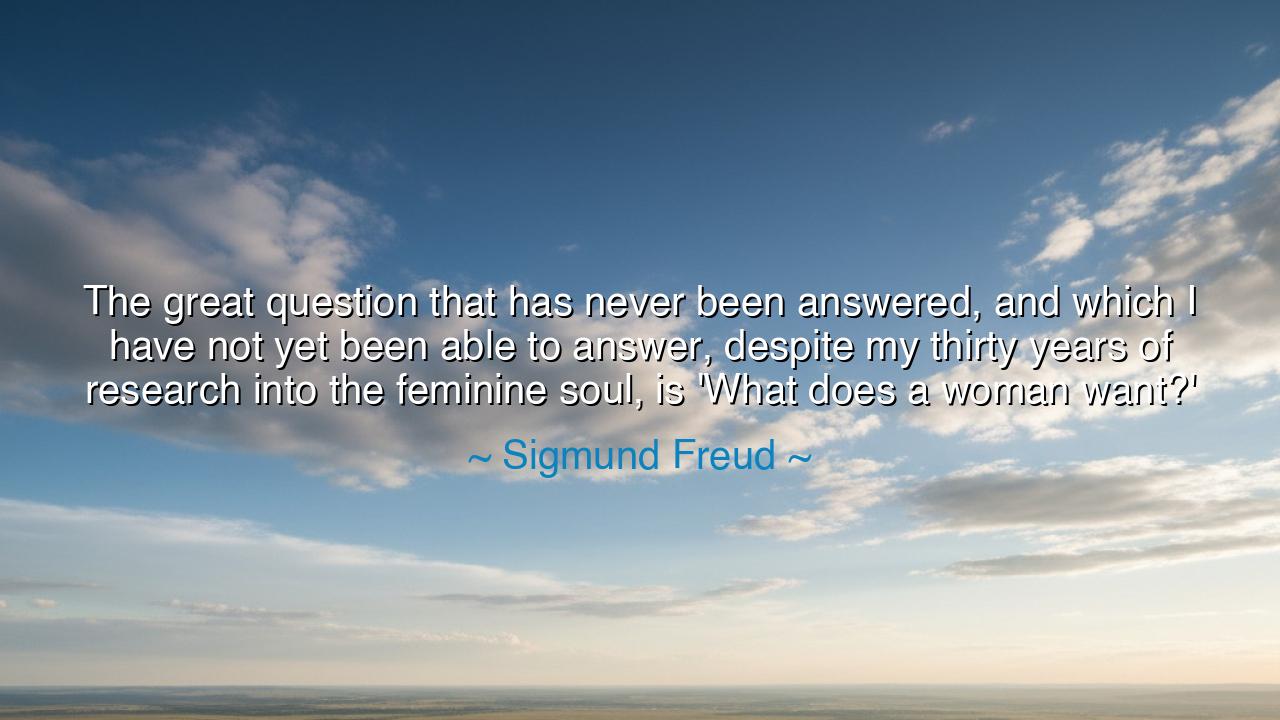
The great question that has never been answered, and which I have
The great question that has never been answered, and which I have not yet been able to answer, despite my thirty years of research into the feminine soul, is 'What does a woman want?'






The words of Sigmund Freud—“The great question that has never been answered, and which I have not yet been able to answer, despite my thirty years of research into the feminine soul, is ‘What does a woman want?’”—resound like a confession uttered by the father of psychoanalysis to the winds of eternity. Here, the great explorer of the human mind admits defeat before the mystery of womanhood, not out of scorn, but out of awe. After decades of probing the hidden recesses of human desire, Freud found in the feminine heart a depth that defied dissection. His words are not the declaration of a skeptic, but the reverence of a pilgrim who, having walked through the deserts of thought, arrived at a sacred mountain and found its summit veiled in mist.
At its core, this quote reveals that the human soul—especially the feminine soul—cannot be wholly measured by logic or science. Freud, who believed reason could illuminate the unconscious, discovered here the limits of reason itself. For womanhood is not merely biological or psychological—it is symbolic, spiritual, eternal. The feminine force is the current of emotion, creation, and intuition that runs through the universe. To ask what a woman wants is to ask what life itself desires—to seek the secret of being. In this way, Freud’s humility becomes a doorway to wisdom: the acknowledgment that not all mysteries are meant to be solved, but rather honored.
From the dawn of civilization, men have wrestled with this enigma. Homer’s Odysseus crossed oceans to return to Penelope, yet even he, cunning and wise, could not fully fathom her silent strength. Dante, in his Divine Comedy, was led to salvation by Beatrice—not through reason, but through love. Shakespeare’s Cleopatra, fierce and mercurial, confounded the might of empires. In all these tales, woman is not merely the beloved or the muse—she is the mystery of creation itself, the embodiment of emotion, intuition, and transformation. Freud’s question, then, is not a failure of understanding, but a recognition of woman as the mirror of life’s unfathomable depth.
Yet, his words also carry a shadow—a reflection of the world’s long misunderstanding of the feminine. For centuries, societies sought to define women by their roles rather than their spirits, to categorize rather than comprehend. Freud’s inquiry, though born from intellectual pursuit, reveals how little even the learned had truly listened. To ask what does a woman want is to admit that man has often spoken for her instead of hearing her voice. But within that question lies the beginning of wisdom, for the wise man is not he who claims to know, but he who dares to ask with humility.
Perhaps the answer to Freud’s question is not hidden in psychology but in empathy. A woman, like any soul, desires to be seen, not as a subject of study, but as a living universe. She wants to be heard, not analyzed; to be loved in her freedom, not confined by expectation. To love and to understand are not the same: love bows before mystery; understanding seeks to conquer it. Freud’s lifetime of inquiry reminds us that the heart’s truth cannot be dissected by intellect alone.
In the end, the question “What does a woman want?” becomes a mirror for all of humanity, for it asks us to confront what any soul truly seeks: to live authentically, to be respected, to be free. The feminine soul—whether in woman or in the depths of man himself—is that part of being which feels, nurtures, and dreams. It is the source of art, compassion, and intuition, and to lose touch with it is to lose touch with life’s tender core. Freud’s admission, then, is not ignorance but reverence before the infinite complexity of love and being.
Let this teaching pass down to future generations: not every question must be answered, for some must instead be contemplated. The feminine mystery is not a riddle to solve, but a flame to protect. The wise do not dissect beauty—they listen to it, stand before it, and let it humble them. So, when you meet a soul you cannot understand, do not force knowledge upon it; let kindness and wonder be your guide. For in the stillness of humility, you may not find an answer—but you will find truth.






AAdministratorAdministrator
Welcome, honored guests. Please leave a comment, we will respond soon